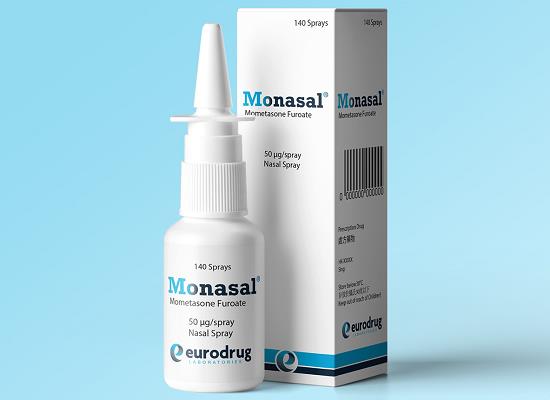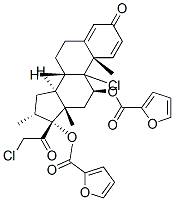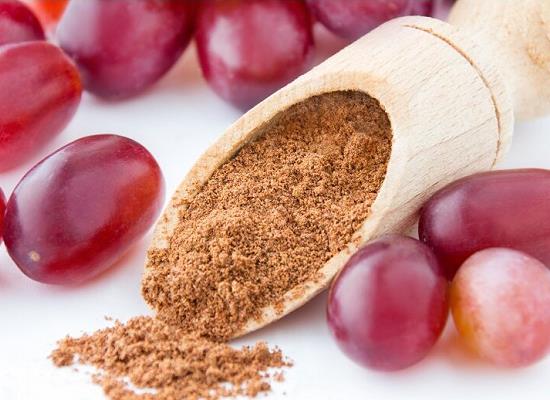Mometasone furoate for the treatment of asthma
General Description
Mometasone furoate is a potent glucocorticoid that acts by binding to an intracellular glucocorticoid receptor and forming a receptor complex which enters the nucleus. It reduces inflammation by inactivating proinflammatory factors and decreasing the influx of eosinophils into the airway submucosa. Mometasone furoate has a higher potency compared to other glucocorticoids due to its very high relative receptor affinity. It exhibits specific pharmacokinetic properties, including low bioavailability and slow degradation, which contribute to its efficacy as a nasal steroid. Mometasone furoate has been proven effective in the treatment of asthma, with intranasal use demonstrating improvement in nasal symptoms and lower inflammation compared to antihistamines. Inhaled Mometasone furoate has demonstrated superiority compared to other inhaled corticosteroids in treating asthma. However, the efficacy of Mometasone furoate NS in controlling asthma is still under investigation.

Figure 1. Nasal spray of mometasone furoate
Pharmacodynamics
Mometasone furoate is a potent glucocorticoid that acts by binding to an intracellular glucocorticoid receptor and forming a receptor complex which enters the nucleus. This complex then binds to glucocorticoid-response elements on specific genes, resulting in the inactivation of proinflammatory factors such as NF-kB and activator protein-1, which typically promote airway inflammation. Additionally, mometasone furoate reduces the expression of interleukin-4 and interleukin-5, decreases the influx of eosinophils into the airway submucosa, and promotes apoptosis of eosinophils. Mometasone furoate has a higher potency compared to other glucocorticoids, attributed to its very high relative receptor affinity (RRA) as assessed by different methods. In competition assays, RRA is defined as a drug’s ability to displace dexamethasone from the glucocorticoid receptor and is used as a reference. In a comparative study, mometasone furoate had a RRA of 2244, while fluticasone propionate and budesonide had a RRA of 1775 and 885, respectively. Overall, mometasone furoate's pharmacodynamics make it an effective treatment option for airway inflammation. 1
Pharmacokinetics
Mometasone furoate exhibits specific pharmacokinetic properties that contribute to its efficacy as a nasal steroid. When used for the treatment of asthma symptoms, the improvement is attributed to the enhancement of nasal function rather than a direct effect on the lungs, as less than 2% of the nasal steroid reaches the chest. The systemic activity of intranasal steroids depends on factors such as systemic bioavailability, plasma protein binding, pharmacologic activity, and clearance. Mometasone furoate has a very low bioavailability, equivalent to fluticasone propionate (0.46% and 0.42%, respectively), but significantly lower than other steroids like budesonide, beclomethasone dipropionate, and triamcinolone acetonide (31%, 44%, and 46%, respectively). Approximately 30% of an intranasal dose of mometasone furoate is deposited in the nose, while the remaining 70% is swallowed and potentially absorbed from the gastrointestinal tract. In this case, it undergoes first-pass hepatic metabolism. Mometasone furoate nasal spray has the lowest fraction of unbound drug (<1%) compared to other intranasal steroids, which is important for minimizing systemic adverse events. The highly lipophilic nature of mometasone furoate enables greater deposition in the targeted tissue of the nasal mucosa. It slowly dissolves with a degradation half-time of 18.4 ± 4 hours, resulting in prolonged contact with the nasal mucosa. Clearance of the solid drug from the nasal submucosa occurs through mucociliary clearance, while plasma clearance primarily takes place in the liver. 1
Clinical efficacy in the treatment of asthma
Mometasone furoate has been proven to be effective in the treatment of asthma. While the intranasal form of Mometasone furoate has shown to reduce nasal symptoms, decrease nasal NO, and improve activity and social functioning, it has also been demonstrated to prevent symptoms and lower inflammation when compared to antihistamine and sodium cromoglycate. In addition, the cost per treatment is lower with MF NS. The clinical efficacy and tolerability of Mometasone furoate NS is similar to budesonide, fluticasone propionate, and triamcinolone. Inhaled Mometasone furoate has demonstrated superiority compared to other inhaled corticosteroids in treating asthma, while MFNS has a similar efficacy and safety profile compared to other intranasal corticosteroids. However, patient acceptance of one device over another may depend on sensory attributes. Mometasone furoate NS has been rated significantly superior compared to FPNS. Intranasal steroids have not shown significant improvement in asthma outcomes, but a tendency towards improvement was observed. Mometasone furoate NS has been found to improve both upper and lower airways in individuals with allergic rhinitis and asthma. It has also been shown to significantly improve asthma symptoms and forced expiratory volume in 1 second in asthmatic individuals with CRS after three months of additional treatment. Overall, while Mometasone furoate has been proven to be effective in the treatment of asthma, the efficacy of Mometasone furoate NS in controlling asthma is still under investigation. 2
Reference
1. Hochhaus G. Pharmacokinetic/Pharmacodynamic Profile of Mometasone Furoate Nasal Spray: Potential Effects on Clinical Safey amd Efficacy. Clin Ther. 2008 Jan;30(1):1-13.
2. Meteran H, Backer V. Mometasone furoate nasal spray for the treatment of asthma. Expert Opin Investig Drugs. 2016;25(8):999-1004.
You may like
Related articles And Qustion
Lastest Price from Mometasone furoate manufacturers

US $0.00/Kg/Bag2025-04-21
- CAS:
- 83919-23-7
- Min. Order:
- 10g
- Purity:
- 97%-102%; USP
- Supply Ability:
- 10kg

US $0.00-0.00/kg2025-04-21
- CAS:
- 83919-23-7
- Min. Order:
- 1kg
- Purity:
- 99%
- Supply Ability:
- 10


